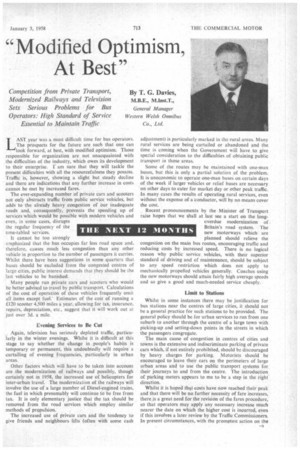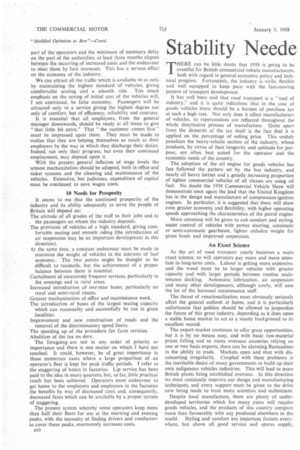"Modified Optimism, At Best"
Page 43

Page 44

If you've noticed an error in this article please click here to report it so we can fix it.
Competition from Private Transport, By T. G. Davies,
Modernized Railways and Television M.B.E., Sets Serious Problems for Bus General Manager Operators: High Standard of Service Western Welsh Omnibus Essential to Maintain Traffic Co., Ltd.
LAST year was a most difficult time for bus operators. The prospects for the future are such that one can look forward, at best, with modified optimism. Those responsible for organization are not unacquainted with the difficulties of the industry, which owes its development to their enterprise. r am sure that they will tackle the present difficulties with all the resourcefulness they possess. Traffic is, however, showing a slight but steady decline and there are indications that any further increase in costs cannot be met by increased fares.
The ever-expanding number of private cars and scooters not only abstracts traffic from public service vehicles, but adds to the already heavy congestion of our inadequate roads and, consequently, prevents the speeding up of services which would be possible with modern vehicles and even, in some cases, disrupts the regular frequency of the time-tabled services.
It cannot be too strongly emphasized that the bus occupies far less road space and, therefore, causes much less congestion than any other vehicle in proportion to the number of passengers it carries. Whilst there have been suggestions in some quarters that buses should be excluded from the congested centres of large cities, public interest demands that they should be the last vehicles to be banished.
Many people run private cars and scooters who would be better advised to travel by public transport. Calculations of the cost of operation of these vehicles frequently omit all items except fuel.' Estimates of the cot of running a £120 scooter 4,500 miles a year, allowing for tax, insurance, repairs, depreciation, etc., suggest that it will work out at just over 3d. a mile.
THE NEXT
Evening Services to Be Cut
Again, television has seriously depleted traffic, particularly in the winter evenings. Whilst it is difficult at this stage to say whether the change in people's habits is temporary or permanent, this undoubtedly will require a curtailing of evening frequencies, particularly in urban areas.
Other factors which will have to be taken into account are the moderniZation of railways and possibly, though certainly not in 1958, the increased use of helicopters for inter-urban travel. The modernization of the railways will involve the use of a large number of Diesel-engined trains, the fuel in which presumably will continue to be free from tax. It is only elementary justice that the tax should be removed from the road services which employ similar methods of propulsion.
The increased use of private cars and the tendency to give friends and neighbours -lifts (often with some cash adjustment) is particularly marked in the rural areas_ Many rural services are being curtailed or abandoned and the time is coming when the Government will have to give special consideration to the difficulties of obtaining public transport in those areas.
Some of the routes may be maintained with one-man buses, but this is only a partial solution of the problem. It is uneconomic to operate one-man buses on certain days of the week if larger vehicles or relief buses are necessary on other days to cater for market day or other peak traffic. In many cases the results of operating rural services, even without the expense of a Conductor, will by no means cover the cost.
Recent pronouncements by the Minister of Transport raise hopes that we shall at last see a start on the long overdue modernization Britain's road system.
new motorways which planned should relieve of The are the congestion on the main bus routes, encouraging traffic and reducing costs by increased speed. There is no logical reason why public service vehicles, with their superior standard of driving and of maintenance, should be subject to any speed restriction which does not apply to mechanically propelled vehicles generally. Coaches using the new motorways should attain fairly high average speeds and so give a good and much-needed service cheaply.
Limit to Stations
Whilst in some instances there may be justification for bus stations near the centres of large cities, it should not be a general practice for such stations to be provided. The general policy should be for urban services to run from one suburb to another through the centre of a large town with picking-up and setting-down points in the streets in which the passengers congregate.
The main cause of congestion in centres of cities and towns is the extensive and indiscriminate parking of private cars which, if not entirely prohibited, should be discouraged by heavy charges for parking. Motorists should be encouraged to leave their cars on the perimeters of large urban areas and to use the public transport systems for their journeys to and from the centre. The introduction a parking meters appears to me to be a step in the right. direction.
Whilst it is hoped that costs have now reached their peak and that there will be no further necessity of fare increases, there is a great need for the revision of the fares procedure, so that operators may apply any necessary increase much nearer the date on which the higher cost is incurred, even if this involves a later review by the Traffic Commissioners. In present circumstances, with the promptest action on the part of the operators and the minimum of necessary delay on the part of the authorities, at least three months elapses between the incurring of increased costs and the endeavour to meet them by fare increases. This has a serious effect on the economy of the industry.
We can attract all the traffic which is available to us only by maintaining the highest standard of vehicles, giving comfortable seating and a smooth ride_ Too much emphasis on the saving of initial cost of the vehicles will, I am convinced, be false economy. Passengers will be attracted only to a service giving the highest degree not only of comfort, but of efficiency, reliability and courtesy.
It is essential that all employees, from the general manager downwards, should be ready at all times to give "that little bit extra." That "the customer comes first' must be impressed upon them. They must be made to realize that they are helping themselves as much as their employers by the way in which they discharge their duties. Indeed, not only their progress, but even their continued employment, may depend upon it.
With the present general inflation of wage levels the utmost mechanization should be adopted, both in office and ticket systems and the cleaning and maintenance of the vehicles. Extensive, but judicious, expenditure of capital must be continued to save wages costs.
10 Needs for Prosperity
It seems to me that the continued prosperity of the industry and its ability adequately to serve the people of Britain will depend on: The attitude of all grades of the staff to their jobs and to . the passengers on whom the industry depends.
The provision of vehicles of a high standard, giving comfortable seating and smooth riding (the introduction of air suspension may be an important development in this direction).
At the same time, a constant endeavour must be made to minimize the weight of vehicles in the interests of fuel economy. The two points might be thought to be difficult to reconcile, but the achievement of a proper balance between them is essential.
Curtailment of excessively frequent services, particularly in the evenings and in rural areas.
Increased introduction of one-man buses, particularly on rural and semi-rural routes.
Greater mechanization of office and maintenance work. The introduction of buses of the largest seating capacity which can reasonably and successfully be run in given localities.
Improvement and new construction of roads and the removal of the discriminatory speed limits.
The speeding up of the procedure for fares revision. Abolition of the tax on derv.
The foregoing are not in any order of priority or importance and there is one matter on which I have not touched. It could, however, be of great importance in those numerous cases where a large proportion of an operator's fleet is kept for peak traffic periods. I refer to the staggering of hours in factories. Lip service has been paid to the idea in many quarters, but, so far, little practical result has been achieved. Operators must endeavour to get home to the employers and employees in the factories .the benefits by way of decreased costs and, consequently. decreased fares which can be available by a proper system of staggering.
The present system whereby some operators keep more than half their fleets for use at the morning and evening peaks, with the necessity of finding drivers and conductors to cover those peaks enormously increases costs.




































































































